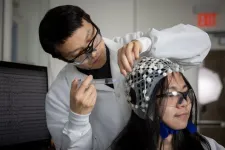(Press-News.org) COLUMBUS, Ohio – Major progress could be made in fighting the youth vaping epidemic with a complete restriction on sweet flavorings and cooling agents in both cartridge and disposable e-cigarette devices, according to a new study from the Center for Tobacco Research at The Ohio State University Comprehensive Cancer Center. The current U.S. Food and Drug Administration (FDA) flavor ban only applies to cartridge electronic cigarette devices.
A new study published in the Journal of Studies on Addiction and Drugs by researchers with the Center for Tobacco Research suggests that sweet flavorings and cooling agents like menthol keep youth puffing e-cigarettes, and the majority indicate they would likely stop vaping if e-liquid flavors were limited to tobacco-flavor only.
Rates of e-cigarette use among young adults and adolescents remain high, despite federal restrictions that limit the availability and appeal to youth. This new study sought to examine how restricting flavors could affect adolescent and young adult e-cigarette usage.
Researchers surveyed 1,414 individuals between the ages of 14 and 17 regarding their e-cigarette use and behaviors. This included demographic and self-reported information about the type of device used, usage habits, preferred flavors, and intent to discontinue use of the vaping device in response to proposed hypothetical comprehensive flavor ban.
Overall, nearly 39% of survey respondents reported they would stop using their e-cigarettes if tobacco and menthol-flavored e-liquids were the only options available, and nearly 71% would quit vaping under a tobacco-only product standard.
“Our data add to an expanding body of evidence showing that youth have a preference for sweet flavorings that make vaping easier for novice users of e-cigarette products, priming them for a potential lifetime of dependency to nicotine,” says Alayna Tackett, PhD, senior author of the study and a researcher with the Center for Tobacco Research at the OSUCCC – James. Tackett is a pediatric psychologist and assistant professor in the division of medical oncology at Ohio State’s College of Medicine.
Banning flavors in e-cigarettes
In February 2020, the U.S. Food and Drug Administration (FDA) put restrictions on flavorings for cartridge/pod e-cigarette (vape) devices, but the ban did not extend to disposable devices or to menthol flavoring for all devices. Sales of e-cig cartridge products went down; however, disposable devices and menthol-flavored pod/cartridge devices went up.
In April 2022, the FDA issued proposed product standards banning menthol flavoring in cigarettes and cigars, but the benefits of these product standards could be weakened by the role of substitute products still available in the market.
Researchers say it is critical to take a closer look at how flavorings impact usage behaviors in youth and adult populations to inform this federal legislation.
Tackett noted that adolescents and young adults using flavors with cooling additives (such as fruit ice) reported higher odds of discontinuing use under a tobacco-only product standard compared with users who preferred menthol flavor only, indicating an important distinction between these groups. (Fruit ice refers to e-cigarette flavors that have a fruit base characterizing flavor with a cooling additive such as menthol or a synthetic cooling agent.)
“In this sample of adolescents and young adults, it appears that non-tobacco flavors may be important for their interest in and continued use of e-cigarettes,” she says.
It is unknown if the current self-reported intentions would extend to actual behavior in the natural environment and how this may impact use or uptake of other tobacco products. Future research might benefit from examining this scenario in areas or states that have flavor restrictions using a more representative sample (the convenience sample used was majority white and majority female).
Cigarette smoking remains the leading cause of preventable death in the United States. Tackett says preventing use of e-cigarettes among young people is a crucial goal for public health, but she also points to the potential impact of e-cigarette regulation on adults who smoke and have begun using e-cigarettes as an alternative to quitting altogether.
“Many adults prefer using non-tobacco flavors to switch from combustible cigarettes to e-cigarettes,” said Tackett. “Flavor restriction policies should consider the best ways to protect public health while supporting adults who are interested in choosing potentially less harmful alternatives to combustible cigarettes.”
To learn more about research at the Center for Tobacco Research, visit cancer.osu.edu/CTR.
###
END
Nearly two thirds of youth would stop vaping without added sweet flavors, menthol, synthetic cooling agents
2023-07-10
ELSE PRESS RELEASES FROM THIS DATE:
Girls Deliver: building an integrated, feminist ecosystem to support adolescent girls at the Women Deliver 2023 Conference
2023-07-10
July 10, 2023 — The Population Council’s GIRL Center, and co-hosts AFIDEP, AMPLIFY Girls, Baobab Research Programme Consortium, Children’s Investment Fund Foundation, Coalition for Adolescent Girls, Exemplars in Global Health, FP2030, Girl Effect, Girls First Fund, Conrad N. Hilton Foundation, the National Democratic Institute (NDI), Plan International, PMNCH, Purposeful, Together for Girls, UNICEF, Women Deliver, and The World Bank Africa Gender Innovation Lab, are proud to host the “Girls Deliver: Pre-Conference on Adolescent Girls,” on July 16. This one-day global convening ...
Light-activated molecular machines get cells ‘talking’
2023-07-10
HOUSTON – (July 10, 2023) – One of the main ways cells “talk” to each other to coordinate essential biological activities such as muscle contraction, hormone release, neuronal firing, digestion and immune activation is through calcium signaling.
Rice University scientists have used light-activated molecular machines to trigger intercellular calcium wave signals, revealing a powerful new strategy for controlling cellular activity, according to a new study published in Nature Nanotechnology. This technology could lead to improved treatments ...
Biomarkers may hold key to precision mental health diagnosis, care
2023-07-10
The study of biomarkers in the brain—powered by cutting-edge machine learning techniques—could redefine the way mental health conditions are categorized and diagnosed and lead to more effective, personalized treatments.
That’s the goal of Yu Zhang, an assistant professor of bioengineering and electrical and computer engineering in Lehigh University’s P.C. Rossin College of Engineering and Applied Science who recently landed major support from the National ...
Navigating the future of underwater geolocalization: how polarization patterns enable new technology
2023-07-10
University of Illinois Urbana-Champaign researchers have developed a novel method for underwater geolocalization using deep neural networks that have been trained on 10 million polarization-sensitive images collected from locations around the world. This new study, led by electrical and computer engineering professor Viktor Gruev, along with computer science professor David Forsyth, enables underwater geolocalization using only optical data while providing a tool for tethered-free underwater navigation.
These findings were recently published in the journal eLight.
“We are showing for the first time, you can geolocate yourself, or a camera, in a number of different ...
Anastasopoulos receives funding for EAGER: building language technologies by machine reading grammars
2023-07-10
Antonios Anastasopoulos, Assistant Professor Computer Science, received $99,294 from the National Science Foundation for: "EAGER: Building Language Technologies by Machine Reading Grammars." This funding began in June 2023 and will end in late May 2024.
Anastasopoulos said, "This project aims to explore the feasibility of building language technologies while bypassing the need for exorbitant amounts of data, instead turning to already-codified linguistic knowledge. This is of particular importance for bridging the language technology gap for underserved communities: ...
Ungvari & Nichols securing core support for International Global Change Research
2023-07-10
Judit Ungvari, Research and Innovation Officer, Institute for a Sustainable Earth, and Leah Nichols, Executive Director, Institute for a Sustainable Earth, Research and Innovation Initiatives, received $277,602 from the National Science Foundation for: "Collaborative Research: Core Support for Future Earth International Global Change Research."
The grant will provide salary to support Ungvari’s work, travel funds, and support costs for participants to attend annual Sustainability Research and Innovation congresses where the Future Earth assembly occurs.
This funding began in May 2023 and will end ...
Conservation in Indonesia is at risk, a team of researchers who study the region argues
2023-07-10
Indonesia, home to the largest tropical rainforest in Southeast Asia and over 17,500 islands, is a country packed with biodiversity and endangered species. However, scientists studying the region’s species and ecosystems are getting banned from Indonesia, and conservation plans are being blocked. In a letter publishing in the journal Current Biology on July 10, a team of conservation researchers with long-term experience in Indonesia discuss scientific suppression and other research challenges they have witnessed while working in the region. They offer suggestions for how to promote nature conservation, protect data ...
Breathing poison: Microbial life on nitric oxide respiration
2023-07-10
Nitric oxide (NO) is a fascinating and versatile molecule, important for all living things as well as the environment. It is highly reactive and toxic, organisms use it as a signaling molecule, it depletes the ozone layer in our planet’s atmosphere, and it is the precursor of the greenhouse gas nitrous oxide (N2O). Moreover, NO might have played a fundamental role in the emergence and evolution of life on Earth, as it was available as a high-energy oxidant long before there was oxygen.
Thus, despite its toxicity, it makes perfect sense that microbes use NO to grow. However, research on the topic is scarce and, to date, microbes growing on it have not been cultivated. ...
Study shows same-sex sexual behavior is widespread and heritable in macaque monkeys
2023-07-10
Observations of a wild colony of macaques over three years show same-sex sexual behaviour among males is widespread and may be beneficial.
The results, published today in Nature Ecology and Evolution, suggest same-sex sexual behaviour (SSB) has evolved and may be a common feature of primate reproduction.
Conducted by researchers at Imperial College London, the observations and genetic data form the first long-term study of SSB in males within one species. Their study challenges the beliefs of some that SSB is a rare behaviour in non-human ...
GPT detectors can be biased against non-native English writers
2023-07-10
In a peer-reviewed opinion paper publishing July 10 in the journal Patterns, researchers show that computer programs commonly used to determine if a text was written by artificial intelligence tend to falsely label articles written by non-native language speakers as AI-generated. The researchers caution against the use of such AI text detectors for their unreliability, which could have negative impacts on individuals including students and those applying for jobs.
“Our current recommendation ...




